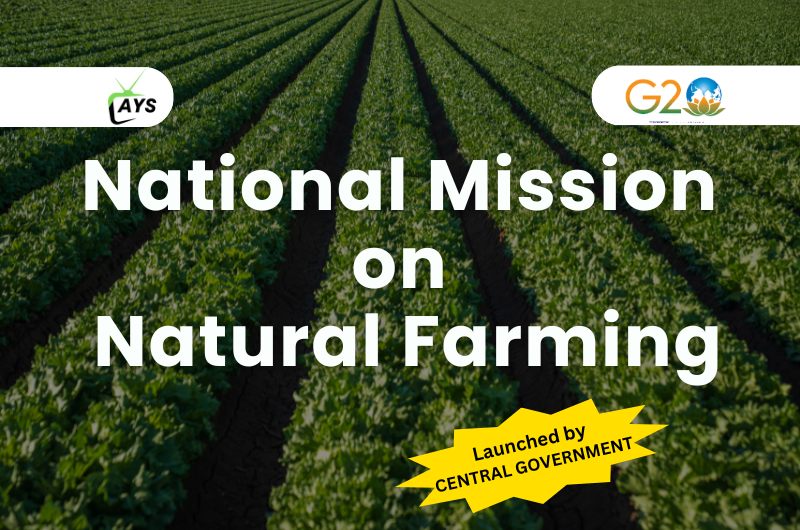


National Mission on Natural Farming

- By agriyouthstory
- (0) comments
- April 4, 2025
National Mission on Natural Farming
A Pathway to Sustainable Agriculture
The National Mission on Natural Farming (NMNF) has revolutionized agriculture, the foundation of India’s economy, toward sustainability. This creative initiative by the Indian government focuses on environmentally friendly and chemical-free farming methods to boost farmer incomes, enhance soil health, and lower input costs.
The National Mission on Natural Farming (NMNF) was launched on November 25, 2024. The Union Cabinet approved the scheme under the Ministry of Agriculture and Farmers’ Welfare. The total outlay of the scheme is ₹2,481 crore, with the government of India contributing ₹1,584 crore and the states contributing ₹897 crore. The scheme is for the duration of 2023–2026.
What is Natural Farming?
An agroecological technique known as “Natural Farming” replaces synthetic fertilizers and pesticides with locally accessible resources such biomass, urine, cow dung, and agricultural wastes. With an emphasis on restoring soil fertility and promoting biodiversity, it guarantees the peaceful coexistence of nature and agriculture.

Key Elements of the NMNF’s Zero-Budget Natural Farming (ZBNF)
-Encouraging cost-effective farming practices Capacity building is the process of giving farmers the skills and knowledge required for natural farming through training programs and field demonstrations.
-Developing groups of organic farming plots to serve as instructional hubs for neighbouring farmers is known as “Model Clusters.”
-Institutional Support: Collaborating with agricultural universities, Krishi Vigyan Kendras (KVKs), and non-governmental organizations to promote natural farming practices.
–Technology and Digital Integration: Monitoring the adoption and impacts of natural farming with satellite imagery and smartphone apps.
Benefits of the Mission
The National Mission on Natural Farming seeks to establish institutional capabilities for recording and sharing best practices, include active farmers as collaborators in the promotion plan, guarantee capacity building and ongoing support, and ultimately draw farmers to natural farming voluntarily based on the system.
–Environmental Sustainability: Natural farming reduces soil deterioration, greenhouse gas emissions, and water consumption.
–Economic Empowerment: Farmers can preserve or boost yields while boosting profit margins by reducing input costs.
–Better Produce: Natural farming produces food that is higher in nutrients and devoid of chemicals, which is better for the health of customers.
-Increasing climate resilience ensures food security by enhancing the ecosystem’s capacity to withstand extreme weather.
Farmer’s Success Stories
Several states, including Andhra Pradesh, Gujarat, and Himachal Pradesh, have emerged as pioneers in natural farming. Farmers adopting these practices report improved soil fertility, reduced input costs, and higher income, showcasing the mission’s potential.
Story of Adaribariki Seethamma of Andhra Pradesh
Adaribariki Seethamma is a lead natural farmer from Pedalabudu village of Araku Mandal, in Visakhapatnam district of Andhra Pradesh.
Technology used: In May 2019, she applied 200 kg of Ghanajivamrit in the soil and ploughed minimally. Seeds of white and red rajma, maize, tomato, red gram, ragi and other millets and leafy vegetables were sowed. All the seeds were sown in line after being treating with Beejamrit.
Impact: She earned a total income of Rs 28,000 from 0.30 acres of land, along with food items for consumption, with a bare cost of Rs 2300.

Story of Hirabhai Bhagvanbhai Vagh of Gujarat
Hirabhai Bhagvanbhai Vaghis a farmer from Landhava Village , District Gir Somnath Gujarat. He had received the Best ATMA Farmers Award-2018-19.
Technology: Natural Farming, along with the application of cow dung, was practised for cultivating groundnut and wheat.
Impact: Natural Farming is low in cost and yields higher profit.

Story of Narvanbhai Khatabhai Gohil of Gujarat
Narvanbhai Khatabhai Gohil is a farmer from Village Sevadivadar, Jesar, District Bhavnagar, Gujarat.
Technology: Banana fruit was planted and Jivamrit, Ghanjivamrit, Nimastra, Daspraniark were applied during the crop cycle. The seeds were treated with Beejamrit before sowing and the crop was monitored.
Impact: The practice is profitable as it saves cost, softens the soil, and increases the soil organic matter, along with quality production and increased retail selling of banana.

Challenges
Challenges Ahead Initial yield volatility, ignorance, and change are some of the challenges facing the transition from conventional to natural farming. aversion. To solve problems, there must be strong legislative support, financial incentives, and continued farmer participation.
Path Ahead
The NMNF aligns with India’s commitment to achieving sustainable development goals and creating a self-sufficient agricultural ecosystem. India can lead the global transition to sustainable agriculture by promoting collaboration between farmers, scientists, policymakers, and the private sector. In order to save the environment and guarantee the sustainability of agriculture, let’s embrace natural farming as both a concept and a method.
How can we contribute to this mission? Let’s start by supporting farmers, increasing awareness, and advocating for sustainable farming practices. If we cooperate, we can make a difference.

